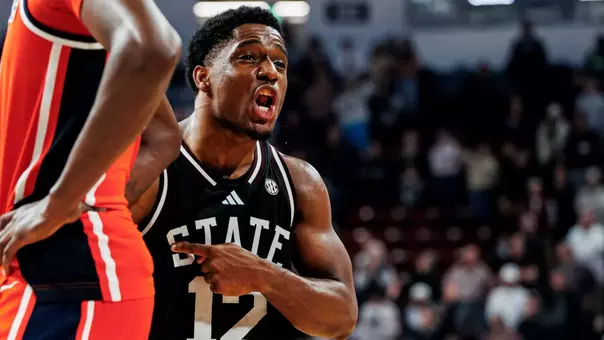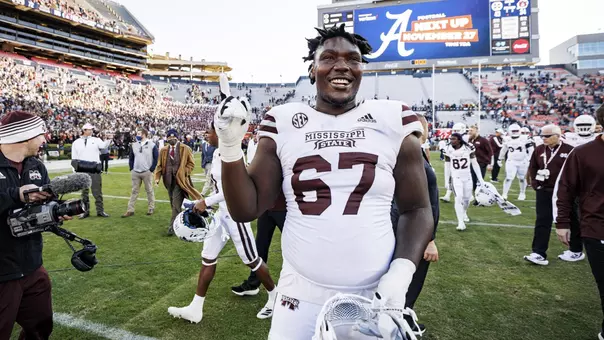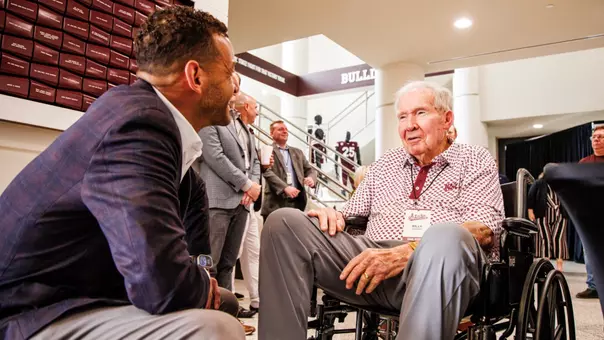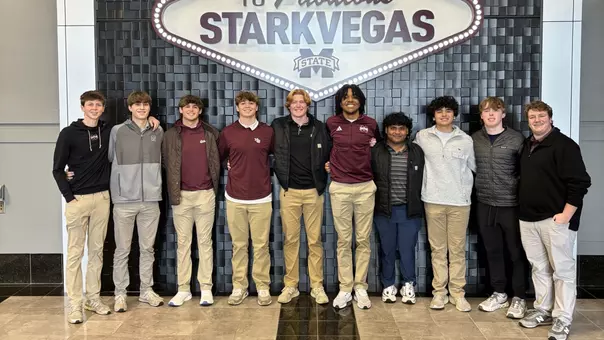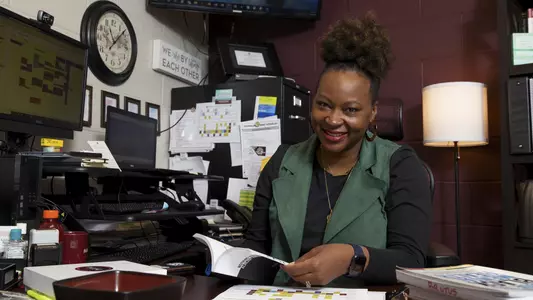
Photo by: Mississippi State Athletics
She Can Be... A Sport Psychologist
February 03, 2021 | Athletics, HailStateBEAT, Counseling & Sport Psychology
STARKVILLE – Common ground brings people together.
For Dr. Angel Brutus, tennis was the common ground for her family members who lived in a different state.
"I wanted to be able to compete with them when we would come to family reunions," she said. "That was really the gateway."
It seemed an easy enough choice of sport for her, but getting involved proved tough.
"The high school I went to was a predominately black school in an area that was of low economic status," explained Brutus. "By the time I got to that school and the spring semester rolled around for tryouts, they made an announcement that tennis was no longer going to be offered due to funding and budget cuts. The one thing I had an interest in went out the door."
As the saying goes, when one door closes, another door opens. For Dr. Brutus, the new door led to algebra class.
"My teacher was a black woman who was over six feet tall. She said that she was recruiting for her volleyball team, so I said 'Sure,'" Brutus said. "I respected her. She had a dominating presence in the classroom. It wasn't like you could say no to her, so I ended up playing volleyball."
The authority figures around her continued to influence her inside and outside the classroom. She later became involved in softball after the coach saw something in her at tryouts. She found time to play softball and volleyball while mixing in cheerleading during the football and basketball seasons.
"I loved the physical activity, the structure, loved doing things outside of academics and had love for those who were the coaches," she said. "The cheer coach was someone who was an avid academic who really held us accountable. The softball coach was the father of one of my classmates who I was really close with, so I would never want to let him down. The volleyball coach was my math teacher who had a dominating presence, and I really had an affinity for her. She really saw something in me that sparked a lot of interest in math. That translated into really wanting to play for her. I don't regret any of those experiences."
Fast forward to her college years at the University of Tennessee. When Brutus entered the world of higher education, she didn't leave athletics behind. From the start of her freshman year, she continued to be involved in athletics in some way while working toward her bachelor's degree in speech pathology.
She worked in football's recruiting department, specifically for defensive coordinator John Chavis. She also worked for the registrar's office, gaining knowledge of graduation requirements and the majors offered, which helped her answer questions for recruits, their parents and even the coaches. She also served as a hostess for all of the spring sports the Vols offered.

"Sport had always been a part of this lifestyle narrative for me," said Brutus. "It boded well for me long after me graduating college and getting into the work force. It came back full circle. One of the reasons why I ended up in the role I serve now is because of all of those experiences."
Once she graduated with her bachelor's degree, she started working toward her master's in speech pathology, which included a field experience element. From that hands-on work, she noticed a gap.
"Regardless of their age, there was always some other life domain that impacted them," Brutus said. "There was something bigger that was impacting these individual's experiences, and I didn't know what it was."
She decided to change her graduate program to help solve the missing piece. She landed on counseling with a rehabilitation concentration.
"You have to look at all the limitations and impairments medically, then understand the implications," Brutus explained. "Then it takes it a step further where you identify accommodations, so those individuals can still navigate their environment with as little resistance as possible. I use that degree more in my day-to-day work than people realize."
After graduating with her master's degree, she worked in a private practice in Atlanta, Georgia, where she was the in-house therapist. She did behavioral interventions and coordinated additional care where necessary.
"The majority of the cases that were coming into our doors were Division I prospective athletes," she explained. "Unfortunately, their academic performance was impacting their recruiting experience. I was thinking to myself that there was more to this, and I really need to understand more. I ended up going back to school for sport-performance psychology, and the rest is history."

Today Brutus holds a bachelor's degree, master's degree, doctorate and a host of other certifications and licenses. Working in sport marries her two passions. Forever a student, she encourages others to continue learning if they have an interest in her position.
"Do the work. Do the research. Adopt a learner mentality," she said. "Suspend any preconceived notions that you might have about what you have to offer, sit back and really engage in listening. I am not just talking about hearing. I am talking about listening intently. Listening to understand, listening to not respond. Remove this idea that you are the expert in the room because every unique individual that crosses our path is the expert on their experience, and we are just here for the ride."
She incorporates a number of approaches in her work depending on her client's needs, but ultimately her guidance comes from the individual when they are given enough time and space to realize solutions themselves instead of having them fed to them.

Though the world has come a long way for women, she says the work is far from finished when it comes to recognition and the culture within sports.
"Know that it's not the recognition that makes us thrive or is the catalyst for doing what we do on a regular basis," she said. "If we were waiting for validation, we wouldn't be as far as we are now."
She has a collective of women in sport across all levels that she engages with when she can, exchanging stories of shared experiences.
"Sometimes it's random, or it's scheduled," Brutus explained. "It's really about being able to serve as support for one another. It's not necessarily because of our woman identity as much as it is about helping each other strategize ways to continue to endure, continuing this marathon we are in."
Brutus was asked to finish the phrase "She can be…" She came up with a single word, but one that carries plenty of weight.
"She can be limitless," she said. "There is this phrase that I typically say often. People say think outside of the box and I say, 'What box?' In my world, there are no boxes. Things are boundless. The possibilities are endless. That is just my philosophy that I live. It definitely shows up in all of the different spaces and places that I navigate. I'm always staying curious, and if things don't exist, the question is 'Why not?' and 'How can I make it happen?'"
For Dr. Angel Brutus, tennis was the common ground for her family members who lived in a different state.
"I wanted to be able to compete with them when we would come to family reunions," she said. "That was really the gateway."
It seemed an easy enough choice of sport for her, but getting involved proved tough.
"The high school I went to was a predominately black school in an area that was of low economic status," explained Brutus. "By the time I got to that school and the spring semester rolled around for tryouts, they made an announcement that tennis was no longer going to be offered due to funding and budget cuts. The one thing I had an interest in went out the door."
As the saying goes, when one door closes, another door opens. For Dr. Brutus, the new door led to algebra class.
"My teacher was a black woman who was over six feet tall. She said that she was recruiting for her volleyball team, so I said 'Sure,'" Brutus said. "I respected her. She had a dominating presence in the classroom. It wasn't like you could say no to her, so I ended up playing volleyball."
The authority figures around her continued to influence her inside and outside the classroom. She later became involved in softball after the coach saw something in her at tryouts. She found time to play softball and volleyball while mixing in cheerleading during the football and basketball seasons.
"I loved the physical activity, the structure, loved doing things outside of academics and had love for those who were the coaches," she said. "The cheer coach was someone who was an avid academic who really held us accountable. The softball coach was the father of one of my classmates who I was really close with, so I would never want to let him down. The volleyball coach was my math teacher who had a dominating presence, and I really had an affinity for her. She really saw something in me that sparked a lot of interest in math. That translated into really wanting to play for her. I don't regret any of those experiences."
Fast forward to her college years at the University of Tennessee. When Brutus entered the world of higher education, she didn't leave athletics behind. From the start of her freshman year, she continued to be involved in athletics in some way while working toward her bachelor's degree in speech pathology.
She worked in football's recruiting department, specifically for defensive coordinator John Chavis. She also worked for the registrar's office, gaining knowledge of graduation requirements and the majors offered, which helped her answer questions for recruits, their parents and even the coaches. She also served as a hostess for all of the spring sports the Vols offered.

"Sport had always been a part of this lifestyle narrative for me," said Brutus. "It boded well for me long after me graduating college and getting into the work force. It came back full circle. One of the reasons why I ended up in the role I serve now is because of all of those experiences."
Once she graduated with her bachelor's degree, she started working toward her master's in speech pathology, which included a field experience element. From that hands-on work, she noticed a gap.
"Regardless of their age, there was always some other life domain that impacted them," Brutus said. "There was something bigger that was impacting these individual's experiences, and I didn't know what it was."
She decided to change her graduate program to help solve the missing piece. She landed on counseling with a rehabilitation concentration.
"You have to look at all the limitations and impairments medically, then understand the implications," Brutus explained. "Then it takes it a step further where you identify accommodations, so those individuals can still navigate their environment with as little resistance as possible. I use that degree more in my day-to-day work than people realize."
After graduating with her master's degree, she worked in a private practice in Atlanta, Georgia, where she was the in-house therapist. She did behavioral interventions and coordinated additional care where necessary.
"The majority of the cases that were coming into our doors were Division I prospective athletes," she explained. "Unfortunately, their academic performance was impacting their recruiting experience. I was thinking to myself that there was more to this, and I really need to understand more. I ended up going back to school for sport-performance psychology, and the rest is history."

Today Brutus holds a bachelor's degree, master's degree, doctorate and a host of other certifications and licenses. Working in sport marries her two passions. Forever a student, she encourages others to continue learning if they have an interest in her position.
"Do the work. Do the research. Adopt a learner mentality," she said. "Suspend any preconceived notions that you might have about what you have to offer, sit back and really engage in listening. I am not just talking about hearing. I am talking about listening intently. Listening to understand, listening to not respond. Remove this idea that you are the expert in the room because every unique individual that crosses our path is the expert on their experience, and we are just here for the ride."
She incorporates a number of approaches in her work depending on her client's needs, but ultimately her guidance comes from the individual when they are given enough time and space to realize solutions themselves instead of having them fed to them.

Though the world has come a long way for women, she says the work is far from finished when it comes to recognition and the culture within sports.
"Know that it's not the recognition that makes us thrive or is the catalyst for doing what we do on a regular basis," she said. "If we were waiting for validation, we wouldn't be as far as we are now."
She has a collective of women in sport across all levels that she engages with when she can, exchanging stories of shared experiences.
"Sometimes it's random, or it's scheduled," Brutus explained. "It's really about being able to serve as support for one another. It's not necessarily because of our woman identity as much as it is about helping each other strategize ways to continue to endure, continuing this marathon we are in."
Brutus was asked to finish the phrase "She can be…" She came up with a single word, but one that carries plenty of weight.
"She can be limitless," she said. "There is this phrase that I typically say often. People say think outside of the box and I say, 'What box?' In my world, there are no boxes. Things are boundless. The possibilities are endless. That is just my philosophy that I live. It definitely shows up in all of the different spaces and places that I navigate. I'm always staying curious, and if things don't exist, the question is 'Why not?' and 'How can I make it happen?'"
MEN'S BASKETBALL | Chris Jans Postgame Press Conference at Alabama - 2/25/26
Thursday, February 26
BASEBALL | Highlights vs. Austin Peay - 2/24/26
Wednesday, February 25
BASEBALL | Aidan Teel & Jack Gleason Austin Peay Postgame Press Conference - 2/24/26
Tuesday, February 24
BASEBALL | Brian O'Connor Austin Peay Postgame Press Conference - 2/24/26
Tuesday, February 24

